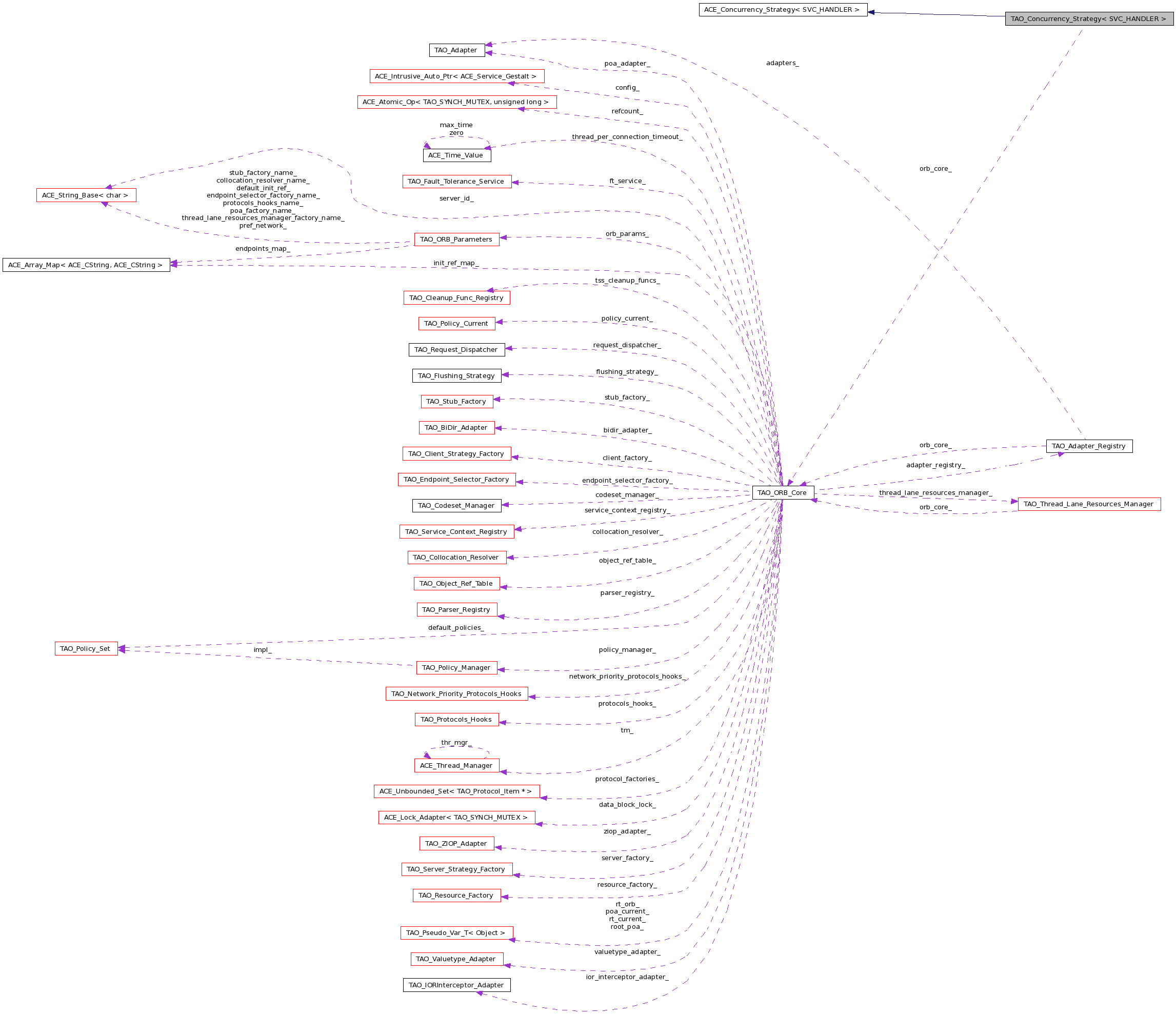Activates the Svc_Handler, and then if specified by the TAO_Server_Strategy_Factory, it activates the Svc_Handler to run in its own thread. More...
#include <Acceptor_Impl.h>


Public Member Functions | |
| TAO_Concurrency_Strategy (TAO_ORB_Core *orb_core) | |
| Constructor. | |
| int | activate_svc_handler (SVC_HANDLER *svc_handler, void *arg) |
Protected Attributes | |
| TAO_ORB_Core * | orb_core_ |
| Pointer to the ORB Core. | |
Activates the Svc_Handler, and then if specified by the TAO_Server_Strategy_Factory, it activates the Svc_Handler to run in its own thread.
Definition at line 62 of file Acceptor_Impl.h.
| TAO_Concurrency_Strategy< SVC_HANDLER >::TAO_Concurrency_Strategy | ( | TAO_ORB_Core * | orb_core | ) |
| int TAO_Concurrency_Strategy< SVC_HANDLER >::activate_svc_handler | ( | SVC_HANDLER * | svc_handler, | |
| void * | arg | |||
| ) | [virtual] |
Activates the Svc_Handler, and then if specified by the TAO_Server_Strategy_Factory, it activates the Svc_Handler to run in its own thread.
Reimplemented from ACE_Concurrency_Strategy< SVC_HANDLER >.
Definition at line 67 of file Acceptor_Impl.cpp.
{
sh->transport ()->opened_as (TAO::TAO_SERVER_ROLE);
// Indicate that this transport was opened in the server role
if (TAO_debug_level > 6)
ACE_DEBUG ((LM_DEBUG,
"TAO (%P|%t) - Concurrency_Strategy::activate_svc_handler, "
"opened as TAO_SERVER_ROLE\n"));
// Here the service handler has been created and the new connection
// has been accepted. #REFCOUNT# is one at this point.
if (this->ACE_Concurrency_Strategy<SVC_HANDLER>::activate_svc_handler (sh,
arg) == -1)
{
// Activation fails, decrease reference.
sh->transport ()->remove_reference ();
// #REFCOUNT# is zero at this point.
return -1;
}
// The service handler has been activated. Now cache the handler.
if (sh->add_transport_to_cache () == -1)
{
// Adding to the cache fails, close the handler.
sh->close ();
// close() doesn't really decrease reference.
sh->transport ()->remove_reference ();
// #REFCOUNT# is zero at this point.
if (TAO_debug_level > 0)
{
ACE_ERROR ((LM_ERROR,
ACE_TEXT ("TAO (%P|%t) - Concurrency_Strategy::activate_svc_handler, ")
ACE_TEXT ("could not add the handler to cache\n")));
}
return -1;
}
// Registration with cache is successful, #REFCOUNT# is two at this
// point.
TAO_Server_Strategy_Factory *f =
this->orb_core_->server_factory ();
int result = 0;
// Do we need to create threads?
if (f->activate_server_connections ())
{
// Thread-per-connection concurrency model
TAO_Thread_Per_Connection_Handler *tpch = 0;
ACE_NEW_RETURN (tpch,
TAO_Thread_Per_Connection_Handler (sh,
this->orb_core_),
-1);
result =
tpch->activate (f->server_connection_thread_flags (),
f->server_connection_thread_count ());
}
else
{
// Otherwise, it is the reactive concurrency model. We may want
// to register ourselves with the reactor. Call the register
// handler on the transport.
result = sh->transport ()->register_handler ();
}
if (result != -1)
{
// Activation/registration successful: the handler has been
// registered with either the Reactor or the
// Thread-per-Connection_Handler, and the Transport Cache.
// #REFCOUNT# is three at this point.
// We can let go of our reference.
sh->transport ()->remove_reference ();
}
else
{
// Activation/registration failure. #REFCOUNT# is two at this
// point.
// Remove from cache.
sh->transport ()->purge_entry ();
// #REFCOUNT# is one at this point.
// Close handler.
sh->close ();
// close() doesn't really decrease reference.
sh->transport ()->remove_reference ();
// #REFCOUNT# is zero at this point.
if (TAO_debug_level > 0)
{
const ACE_TCHAR *error = 0;
if (f->activate_server_connections ())
error = ACE_TEXT("could not activate new connection");
else
error = ACE_TEXT("could not register new connection in the reactor");
ACE_ERROR ((LM_ERROR,
ACE_TEXT("TAO (%P|%t) - Concurrency_Strategy::activate_svc_handler, ")
ACE_TEXT("%s\n"), error));
}
return -1;
}
// Success: #REFCOUNT# is two at this point.
return result;
}
TAO_ORB_Core* TAO_Concurrency_Strategy< SVC_HANDLER >::orb_core_ [protected] |
Pointer to the ORB Core.
Definition at line 78 of file Acceptor_Impl.h.
 1.7.0
1.7.0